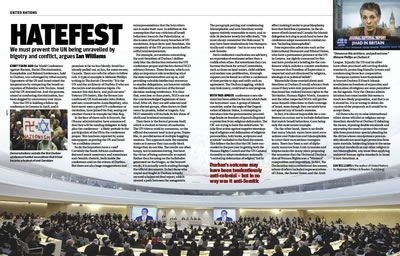
Eight years ago the World Conference against Racism, Racial Discrimination, Xenophobia and Related Intolerance, held in Durban, was sabotaged by tribal enmity. Opponents of the US and Israel raised the temperature by comparing the Israeli occupation of Palestine with Nazism. Israel and the US stormed out. And the process, aimed at combating discrimination, has been dogged by controversy ever since.
Now the UN is holding a follow-up conference in Geneva in April, and it promises to be no less bloody. Israel has already pulled out, as has, for some reason, Canada. There are calls for others to follow suit. A typical example is Melanie Phillips writing in The Jewish Chronicle: "It is the UN and the architects of Durban II who are the racists and murderous bigots. Denounce this sick farce, and pull out now." Veteran UN-haters, like the former (unconfirmed) US Ambassador John Bolton and neo-conservative Anne Bayefsky, who have never seen a good UN conference or resolution, have joined the fray, seeing yet another chance to trample the blue flag.
In the face of these calls to boycott, the Obama administration have announced that they will be sending delegates to help plan the conference - a likely prelude to the participation of the US in the conference proper. This has been reported by some newspapers as putting the US and Israel "on a collision course".
So do the boycotters have a case? Certainly the South African conference featured much unsavoury and sometimes anti-Semitic rhetoric, both inside the conference and on the streets of Durban. But there are also huge exaggerations and misrepresentations that the boycotters use to make their case. In addition to the assumption that any criticism of Israeli behaviour towards the Palestinians, or discussion of Israel's many breaches of UN resolutions, is ipso facto anti-Semitism, the complexity of the UN process lends itself to wilful misinterpretation.
For example, accusations concerning the anti-Semitism of Durban I deliberately blur the distinction between the UN conference proper and the less formal NGO advisory forums. These forums, which can play an important role monitoring what the state representatives are up to, and providing valuable intellectual resources to smaller delegations, are however outside the deliberative structure of the formal decision-making conference. It is clear that, even less so than poets, NGOs are not the unacknowledged legislators of mankind. After all, they are self-selected and non-elected groups, often drawn to their cause by passion, belief or tragedy. Any NGO assembly will include its fair share of shrill and irrational extremists.
Then there is the formal process itself, which is stacked in favour of confusion. The UN tries to work by consensus, so the official documents tend to just grow, Topsy-like, in parallel series of multiple haggling sessions. This approach suits the member states as it means they can easily block things they do not like. The results are often lumpy, not to mention boring, but have the virtue of being universally accepted. Rather than focusing on the hullabaloo generated on the fringes, as the boycotters do, it is actually worth wading through the official documents. In fact those who stayed and fought in Durban actually secured a balanced final report, which steered a path between the antagonists. The paragraph pairing and condemning Islamophobia and anti-Semitism would appear entirely reasonable to most, and article 58 declares tersely but effectively, "We must always remember the Holocaust."It may have been tendentiously but therapeutically anti-colonial - but in no way was it anti-Semitic.
Such conference conclusions are advisory, an expression of sentiment rather than a codification of law. But sometimes they can become the basis for actual Conventions, such as those on land-mines, child soldiers and nuclear non-proliferation, if enough support can be found to call for a conference of state parties to sign and ratify such an agreement. The Durban haggling, while it may look messy, could lead to real progress.
With this April's conference a new element has been added to the mix which fuels the boycotters' case. A group of Islamic countries, under the aegis of the Organisation of Islamic States, is attempting to introduce into the governmental proceedings limits on freedom of speech disguised as protection from religious defamation. The OIC are trying to have the exhortation "to take firm action against negative stereotyping of religions and defamation of religious personalities, holy books, scriptures and symbols" included in the final document. This follows the fact that the OIC have succeeded in the past year in getting both the Human Rights Council and the UN General Assembly to adopt resolutions notionally "combating defamation of religion" but in effect making it easier to pass blasphemy laws that limit free expression. In the absence of both Israel and Canada the Islamic delegation is trying to push hard to have the conference adopt measures to combat racism "including Islamophobia".
Free expression advocates such as the International Humanist and Ethical Union, who have a permanent presence at the UN in Geneva, are rightly concerned by this and have produced a briefing for the conference which calls for a counter resolution "to ensure that Freedom of Expression is respected and not dismissed by religious, ideological or political beliefs".
Meanwhile those worried about anti-Semitism at Durban II would advance their cause if they were ever prepared to admit that Israel has violated human rights in the Territories. Human Rights Watch, Amnesty and the other respected NGOs still get the same frenetic objections to their coverage of Israel, even though they certainly have not spared any of Israel's enemies.
In fact, it is almost impossible for a conference on racism not to include definitions that match Israeli behaviour, Gaza being only the most recent example.
On the other hand, there is no doubt that many Islamic states have used accusations over Palestine and Islamophobia to cover their own serious transgressions. There has been a sort of diplomatic susurrus from Arab tyrannies and kleptocracies for many years proposing the nonsense that the Universal Declaration of Human Rights was a "Western" composition and imposition. In fact, the Declaration was a consensual document, whose drafters included representatives of China, the Soviet Union and the Arab League. Equally the US and its allies have often practised self-serving double standards, protecting friendly tyrants and condemning those less cooperative.
European nations have threatened to boycott Durban II if such Islamic resolutions on freedom of expression and defamation of religions are even permitted on the agenda. Now the Obama administration has come onside this seems a much less likely proposition, and that is as it should be. It is as wrong to debar discussion of the proposals as it would be to accept them.
All those who try to raise international ethics above tribalist or religious exceptionalism should be at Durban II debating the issues, exposing double standards and separating the need to protect the vulnerable from pernicious special pleading for the divine whose omnipotence presumably should not need legal protection from mere mortals. Subjecting Islam to the same sceptical standards as any other religion is not Islamophobia, any more than applying universal human rights standards to Israel is anti-Semitism.

